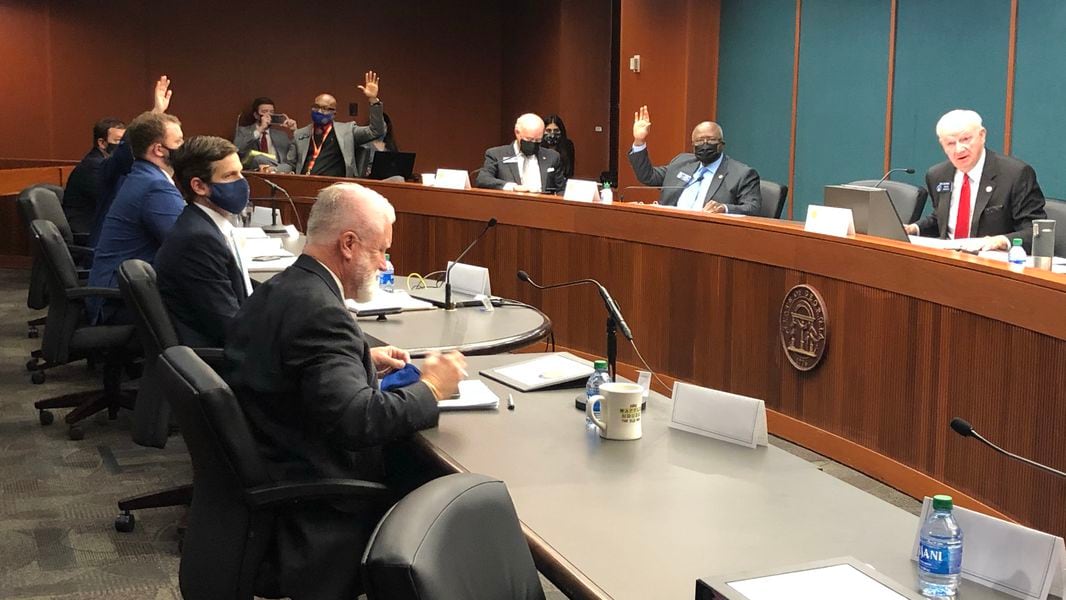What is the GA General Assembly?
The Georgia General Assembly is comprised of the Georgia State House and the Georgia State Senate. The Georgia General Assembly meets in the State Capitol in Atlanta, not too far from Georgia Tech's main campus. Each chamber is in session for 40 days per year - typically January through April with special sessions called for redistricting and/or in emergencies. The official website of the Georgia General Assembly is linked below.
There are 56 seats in the Senate and 180 seats in the House filled by elected legislators representing a certain part of the state known as a district (districts are defined differently for the House and Senate). Terms for legislators of both chambers are two years apiece. The next elections for the Georgia General Assembly are to be held in 2022.

Georgia State Capitol
// Photo courtesy of DXR, CC BY-SA 4.0, via Wikimedia Commons
What Issues Are at Play in the GA Legislature?
Decisions made in the Georgia General Assembly affect a wide variety of state-wide issues and concerns. Though this list is certainly not exhaustive, here are some of the issues the Georgia General Assembly has control over whether it be by creating new laws concerning these topics or amending existing ones.
-
Environmental Justice: controls environmental regulation
-
Criminal Justice: controls laws around policing and imprisonment, funds and controls the Georgia Department of Corrections (GDOC)
-
Voting Rights: controls all voting laws and processes for the state
-
Education: funds and controls K-12, pre-K, and University System of GA (USG) schools, including the Dual Enrollment/Move On When Ready program
-
Redistricting/Gerrymandering: draws US House and state legislature districts
-
COVID-19: controls GA Department of Public Health (DPH) funding, worker protections
-
Healthcare: controls Medicaid expansion, Peachcare, welfare
-
Transportation: MARTA, road laws, road construction
-
Taxes: collects and spends taxes, determines loopholes and tax breaks
What are Committees?
Committees are essentially what drives the legislative process. Members of the chamber make up a committee that is usually formed to discuss a certain topic or issue. Bills introduced in the Georgia General Assembly must be appointed to a committee. From there, the committee chairman decides which bills will get a hearing. A bill hearing allows legislators, the public, and lobbyists to address the committee, usually with the purpose of educating the committee on the issue, persuading members to vote a certain way, or suggesting amendments to the bill. (source)
Georgia Senate Ethics Committee // Photo courtesy of AJC
The current committees for the Georgia Senate and Georgia House can be found below.
Tracking Bills in the GA General Assembly
Tracking bills in the Georgia General Assembly is a good way to remain informed about what's happening in our state government. Though every bill's journey is different, learning about which bills are being introduced and discussed can be valuable. Although it's best to track bills through the Georgia General Assembly website, there are other resources that might be useful.
OpenStates.org is not an official government website, so we cannot guarantee the accuracy of any of the information presented on their website, but it can be a helpful resource when tracking bills. Georgia's page on OpenStates is linked below.
Another good resource for tracking bills in the General Assembly is the AJC Legislative Navigator. Again, this is not an official government website, so we cannot guarantee the accuracy of the information on their website. Additionally, we do not endorse any opinions or attitudes expressed by the AJC as VoterTech is a non-partisan group. The AJC Legislative Navigator is linked below.
How Do I Find My Legislators?
To find your Georgia state legislators, click on the link below which links to the Georgia General Assembly website. Once there, follow one of the several ways to find your legislators.
Contacting your representative or senator is also easy using the Georgia General Assembly website. Once you've identified your legislators, click here for the House directory and click here for the Senate directory. Click on the profile of your legislators. Your representative's and senator's contact information should be included in their directory profile. Their profile will also include the committees they serve on and legislation they've sponsored.

